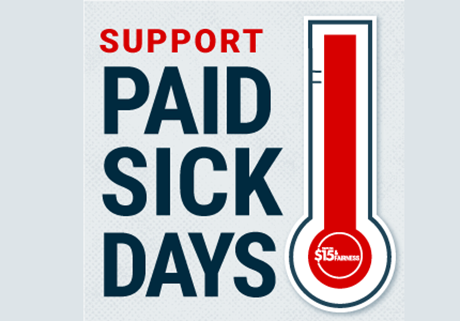Features
You are here
Fighting for $15 and Fairness is a matter of health

February 13, 2017
Precarious work is a threat to your health. Poverty wages undermine access to the social determinants of health—like food, shelter, clothing, education, which is why there’s a clear correlation between wealth and health. Poverty wages also undermine access to healthcare, preventing those with the greatest health needs from filling their prescription and accessing dental, physiotherapy and other health services. By combining low income with unstable and stressful conditions, precarious work is a threat to health.
As World Health Organization explains, “A number of employment-related conditions are associated with poorer health status, including unemployment and precarious work …Mortality is significantly higher among temporary workers compared to permanent workers. Poor mental health outcomes are associated with precarious employment (eg informal work, temporary contracts, and part-time work). Workers who perceive work insecurity experience significant adverse effects on their physical and mental health…Stress at work is associated with a 50% excess risk of coronary heart disease, and there is consistent evidence that high job demand, low-control, and effort-reward imbalance are risk factors for mental and physical health problems”
Sick days and sick notes
To add insult to injury, many precarious workers do not get any paid sick days or even job protection for unpaid personal emergency leaves. Too often the are required to get sick notes to prove to their employers that they are sick. These policies also undermine health.
As the World Health Organization’s explains, “if you feel unwell, have a fever, cough or sore throat, stay at home and keep away from work, school or crowds.” But that’s exactly what workers cannot do if they do not have paid sick days or if they are required to get a sick note.
Not only does this prolong their illnesses by preventing them from recuperating at home, but it also puts others at risk—especially in food service or healthcare. A Study by Centre for Disease Control found that more than half of food service workers had gone to work sick, the most common reason being that the restaurant did not offer paid sick days. Half of these workers went to work sick to avoid loss of pay and a quarter went to work sick because of fear of losing their job.
The requirement for sick notes compounds the problem—by unnecessarily sending sick workers to clinics and hospitals just to get notes, taking away their time for recovery, taking up healthcare resources and putting others at risk of infection.
Fight for $15 and Fairness
The Fight for $15 and Fairness is making work healthier, by raising wages and gaining sick days. In 2016 sick day laws were passed across the US—in the states of Arizona, Vermont and Washington, and the cities and counties of Spokane, Minneapolis, St. Paul, Chicago, Cook County, Santa Monica, Los Angeles, Berkely, Morristown and Plainfield. As Los Angeles McDonald’s worker Rosangela Bañuelos explained, “LA city council voted to double our paid sick days from 3 to 6. This didn’t happen by luck, but because workers and the community made our voices heard.”
In Ontario, workers and communities doing the same, uniting for decent work, including paid sick days, fairer scheduling, respect at work and an end to racism and Islamophobia in the workplace.
In the next few months the government will release the final recommendations for the Changing Workplace Review, a rare chance to improve the Employment Standards Act and Labour Relations Act that affects millions of workers. While the bosses are pushing to maintain the precarious status quo, the Fight for $15 and Fairness is raising demands that improve work, all of which would improve health: decent hours, universal standards and respect at work would reduce stress; the right to organize and unionize would allow workers to push for healthier workplaces; and paid sick days would allow workers to recover while keeping the community safe.
Pressure from the campaign has already pushed the Ontario NDP to call for a $15 minimum wage and a recent CBC news report shows that the Liberals are now considering including a $15 minimum wage in their election platform for June 2018—tacking left as they did the last election. 2017 will be a key year to fight for $15 and fairness, and the health benefits it brings.
Join the February 15 solidarity rally with Aramark food service workers fighting for $15 and Fairness at York
Section:









